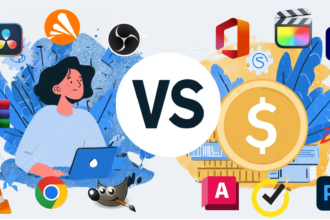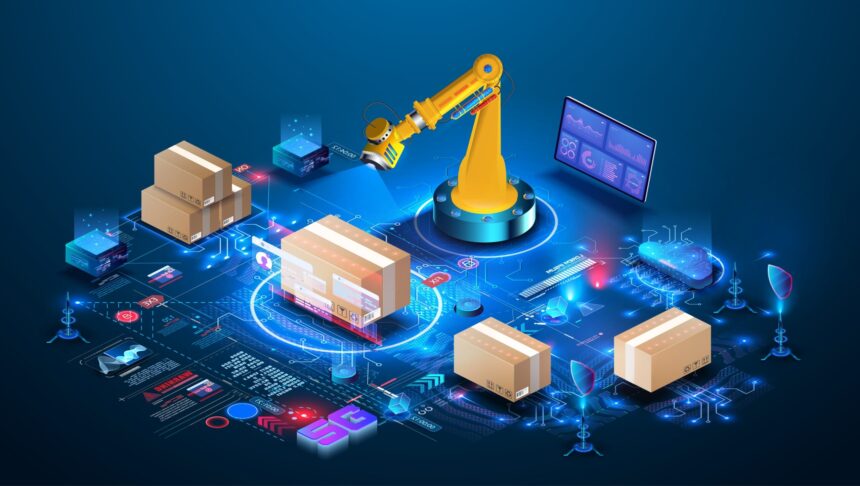I will discuss the AI Tools for Supply Chain Management that are transforming business operations in this modern era.
These technologies utilize artificial intelligence to improve forecasting, logistical operations, inventory management, and risk assessment. The implementation of these tools allow for increased organizational efficiency, agility, and resilience in the context of global supply chains.
What is Supply Chain Management?
Supply Chain Management (SCM) pertains to the supervision and coordination of all activities necessary to produce and deliver goods or provide services, including the sourcing of bare materials and the reaching of the end customer.

It includes procurement, production, logistics, and distribution activities, and customers receive value and quality services in a timely and cost-effective manner.
SCM also focuses on building partnerships with suppliers and other stakeholders, controlling risks, and using technology for real time, tracking and optimization which makes businesses more competitive and responsive to real time market changes.
How To Choose AI Tools for Supply Chain Management
Below are tips on selecting AI technologies relevant to the Supply Chain Management.
Identify Business Needs – Establish whether you will be using AI for demand forecasting, inventory management, logistics, or risk mitigation.
Scalability – Make certain the tool can scale alongside your supply chain business activities.
Integration – Make AI selections that operate seamlessly with pre-existing ERP or supply chain frameworks.
Data Accuracy & Analytics – AI tools that provide real-time information and advanced predictive analytics should be prioritized.
User-Friendliness – Interfaces require to be intuitive and readily usable so that no or minimal training is required.
Cost & ROI – Analyze the offered pricing structures against the anticipated costs, savings, or improved business efficiency.
Security & Compliance – The selected software should comply with industry standards on data security and regulations.
Vendor Support – Select vendors with the highest reported customer satisfaction and software maintenance records.
Key Point & AI Tools for Supply Chain Management List
| AI Tool | Key Point |
|---|---|
| Blue Yonder | Provides advanced demand forecasting and inventory optimization powered by AI. |
| IBM Supply Chain AI | Focuses on real-time visibility, risk management, and predictive insights. |
| C3 AI Supply Chain Suite | Delivers end-to-end supply chain AI solutions for optimization and cost reduction. |
| ThroughPut AI | Specializes in process efficiency by identifying bottlenecks using AI-driven analytics. |
| Llamasoft (by Coupa) | Known for supply chain design, simulation, and AI-based scenario planning. |
| FourKites | Offers real-time shipment tracking and predictive ETA analytics. |
| Magaya Supply Chain | Provides AI-driven automation for logistics, warehousing, and freight forwarders. |
| Elementum | Focuses on incident management and real-time issue resolution in supply chains. |
| Infor Nexus | Cloud-based platform enabling supply chain collaboration with AI insights. |
| E2open | Provides AI-powered connected supply chain solutions across demand, supply, and logistics. |
1.Blue Yonder
Blue Yonder stands out as a forerunner in artificial intelligence applications in supply chain management for its predictive demand forecasting and automation capabilities. Its uniqueness stems from its use of advanced machine learning algorithms that dynamically adjust to real-time market conditions for optimum inventory management and minimal stockout occurrences.
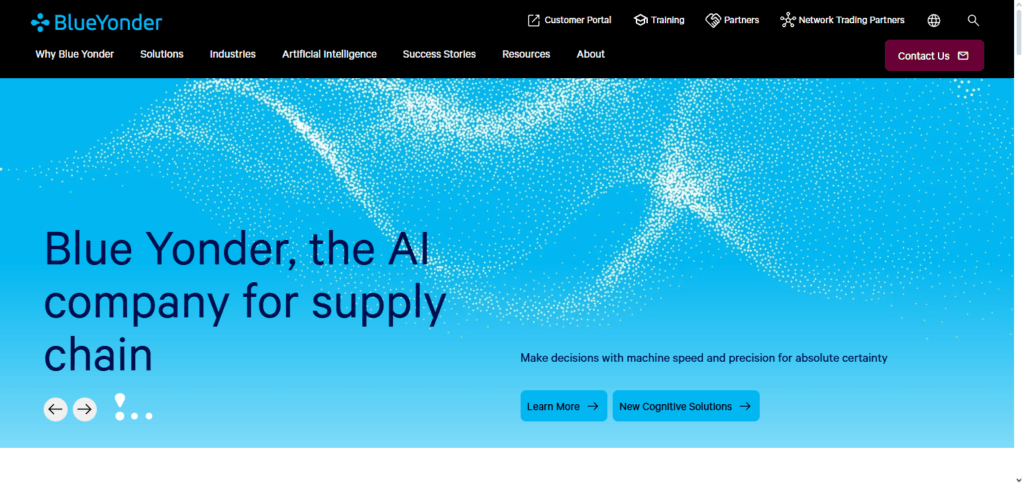
Unlike other systems, Blue Yonder’s incorporation of retail, manufacturing, and logistics workflows into the system is truly holistic, enabling the provision of actionable insights and guiding smarter decisions. Its optimizations empower businesses using Blue Yonder to increase operational efficiency, resilience, and customer-centered satisfaction.
2.IBM Supply Chain AI
IBM Supply Chain AI optimizes visibility, resilience, and intelligence across global supply networks fostering more informed and insightful decision-making. It provides its distinct advantage by integrating AI-driven insights with blockchain transparency enabling businesses to mitigate trust issues with supplier data and anticipate disruption.
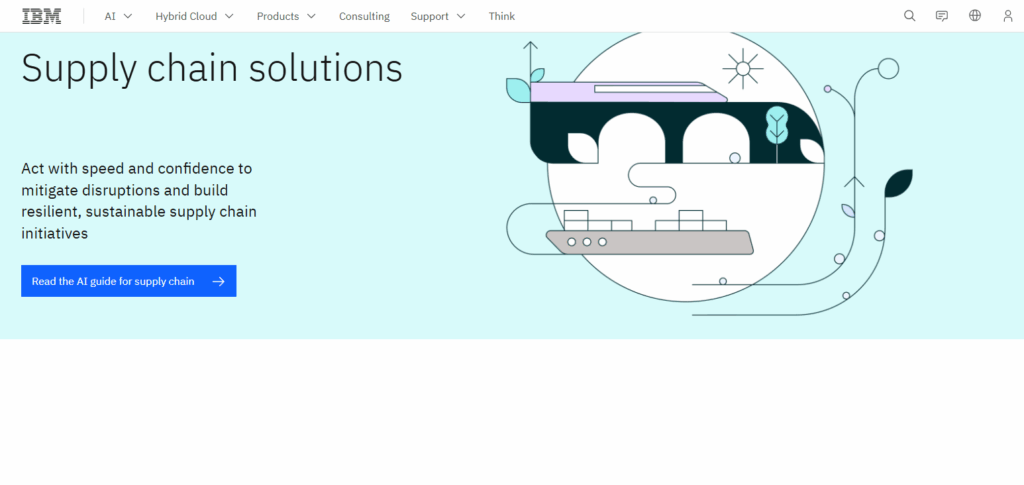
Unlike standard tools, it provides real-time monitoring and dynamic alerts that help mitigate risk and improve responsiveness. By Integrating with other systems, IBM Supply Chain AI enables faster adaption and optimization of organizational operations, helping businesses sustain agility within volatile markets.
3.C3 AI Supply Chain Suite
C3 AI Supply Chain Suite is a modern solution engineered to enhance supply chain efficiency using AI analytics and automation. Its cutting edge feature is the ability to integrate disparate data from different systems into a cohesive, intelligent system which enhances precision in forecasting and enables rapid decision making.
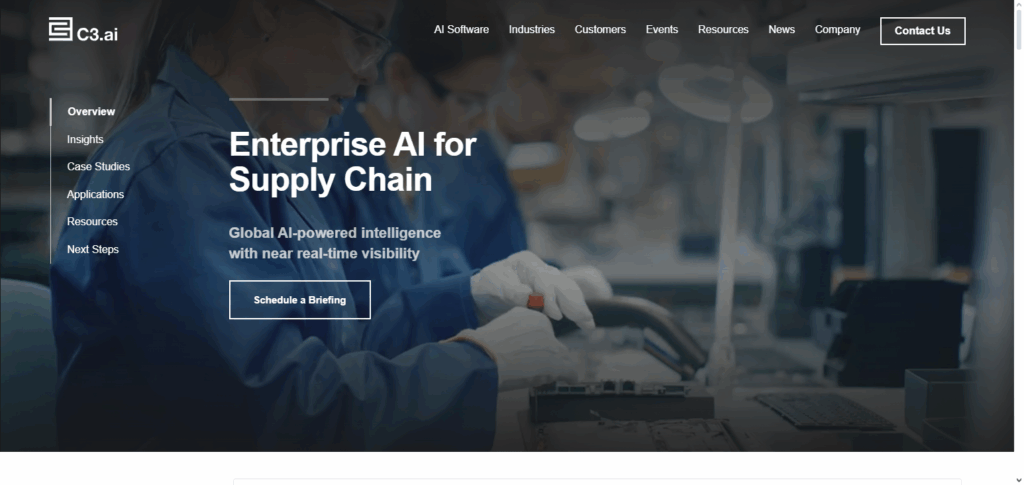
Rather than focusing on responsive production, as is the case for most legacy systems, it focuses on demand forecasting, supplier risk evaluation, and production scheduling using advanced AI at the scale of the entire enterprise. This is a strong option for any business seeking streamlined operations, reduced costs, and greater agility in navigating complex global supply chain networks.
4.ThroughPut AI
ThroughPut AI is an advanced tool for supply chain management strategically engineered to enhance efficiency by identifying operational bottlenecks and eliminating them. Its distinct advantage is the use of AI-based flow analytics to optimize throughput in procurement, production, and logistics.
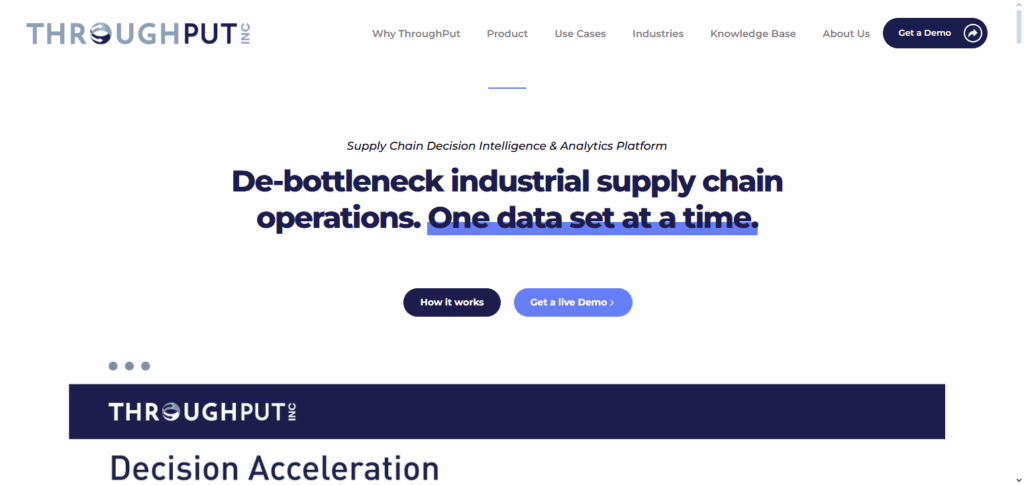
Unlike traditional systems, it focuses on and corrects overlooked inefficiencies and processes data to provide insights instead of just information. ThroughPut AI’s ability to improve resource management while simultaneously minimizing waste make it an ideal solution for businesses looking to improve productivity, profitability, and agility in today’s increasingly competitive environment.
5.Llamasoft (by Coupa)
Llamasoft, now part of Coupa, specializes in artificial intelligence applications in supply chain management, offering capabilities in sophisticated modeling, simulation, and scenario planning. Its distinctive value proposition lies in allowing businesses to craft and evaluate “what-if” scenarios, thereby testing various supply chain strategies ahead of actual implementation.
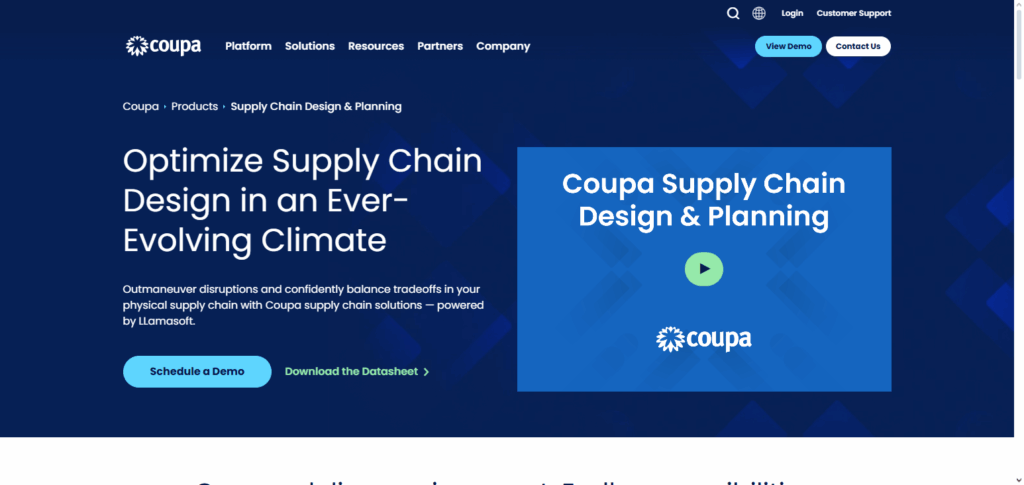
Its use goes beyond providing basic networks insights, as it evaluates and provides intelligence on optimization, costs, risks, and more. Coupa’s spend management solutions give Llamasoft’s analytics the edge to properly evaluate and make decisions, making it easier for organizations to make data-driven decisions on their supply chains.
6.FourKites
FourKites is an AI-driven supply chain management tool which offers real-time visibility and shipment tracking as well as predictive analytics. Its real-time traffic, weather, and carrier data analytics provide data-driven accuracy for ETAs.
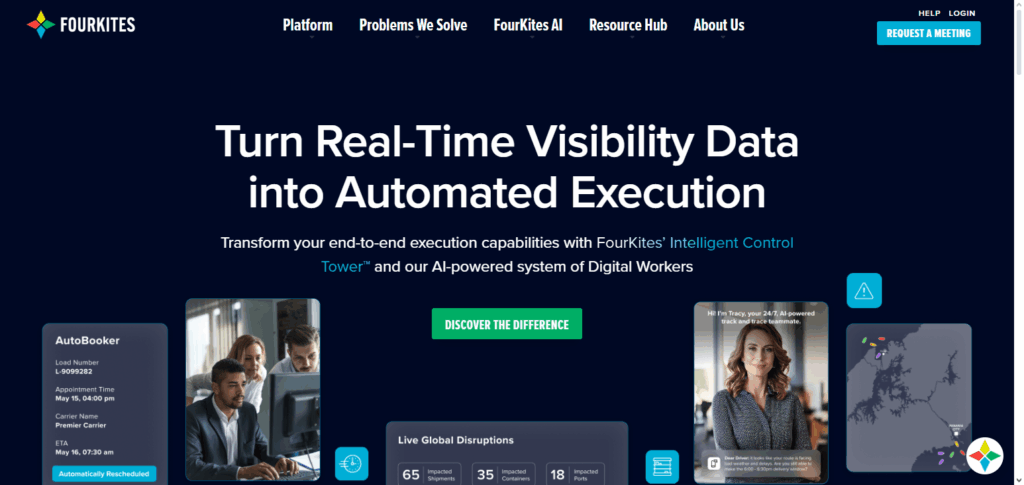
FourKites eliminate the need for traditional tracking systems by offering proactive alerts which assist businesses in optimizing operations and improving customer satisfaction. Because it enhances transparency across multimodal logistics, it is an appealing option for companies looking to bolster the efficiency, reliability, and resilience of their supply chain operations.
7.Magaya Supply Chain
Magaya Supply Chain is an AI solution that automates and optimizes processes, including logistics, warehousing, and freight forwarding. Businesses can now automate processes and utilize real-time data intelligence for shipment optimization, inventory tracking, and minimizing manual errors.
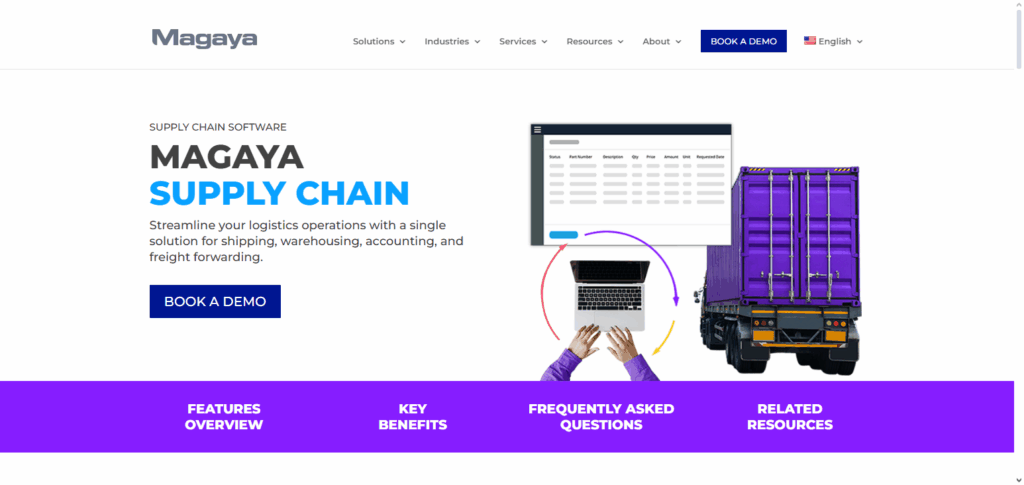
Unlike traditional systems, Magaya integrates with worldwide trade processes and provides comprehensive visibility along with compliance support. It allows logistics and other businesses to improve precision, efficiency, and user satisfaction, serving as an alternative AI-assisted supply chain management solution.
8.Elementum
Elementum is a real time incident management and issue resolution supply chain management platform powered elements of AI. Elementum’s diferenciating feature is managing intricate disruptions as workflows in simplifying steps, making problem solving in procurement, logistics and production much simpler and faster.
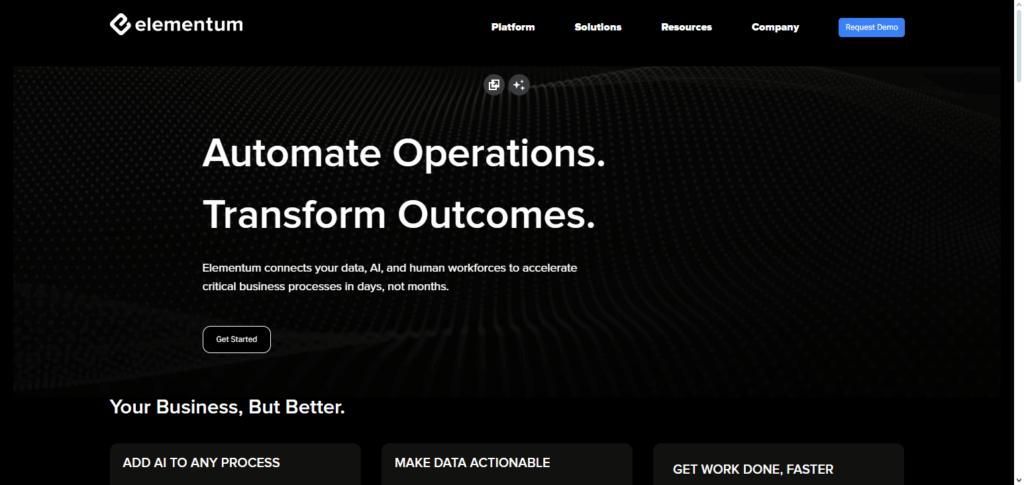
Unlike legacy systems, Elementum uniquely integrates communication and information and eliminates fragmentation, allowing system users to work together without hindrance during supply chain problems.
As a replacement, it helps organizations reduce unproductive time, enhance agility, and sustain business operations, making supply chains more robust and attuned to customers in volatile market environments.
9.Infor Nexus
Infor Nexus is a web-based artificial intelligence application for managing supply chains that facilitates collaboration and visibility with global partners. It optimally integrates suppliers, manufacturers, logistics providers, and retailers within a single digital ecosystem for greater efficiency and insight powered by AI.
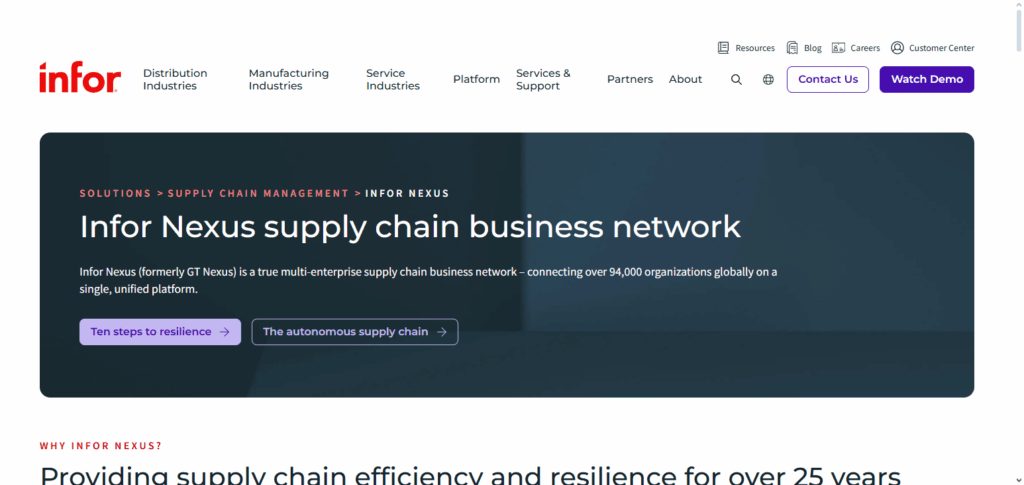
It focuses on collaboration in contrast to conventional systems that work in silos, making use of forward-looking analytics, collaboration-based real-time mechanisms, and optimization of the financial supply chain. Infor Nexus enables businesses to reduce lead times, enhance cash flow, and improve resilience, thus making global supply chains agile and responsive.
10.E2open
E2open is an integrated AI-based system for managing supply chains which synchronizes demand, supply, and logistics into one intelligent system. Its distinct competitive advantage is the ability to use connected AI insights for end-to-end visibility and coordination within global networks.
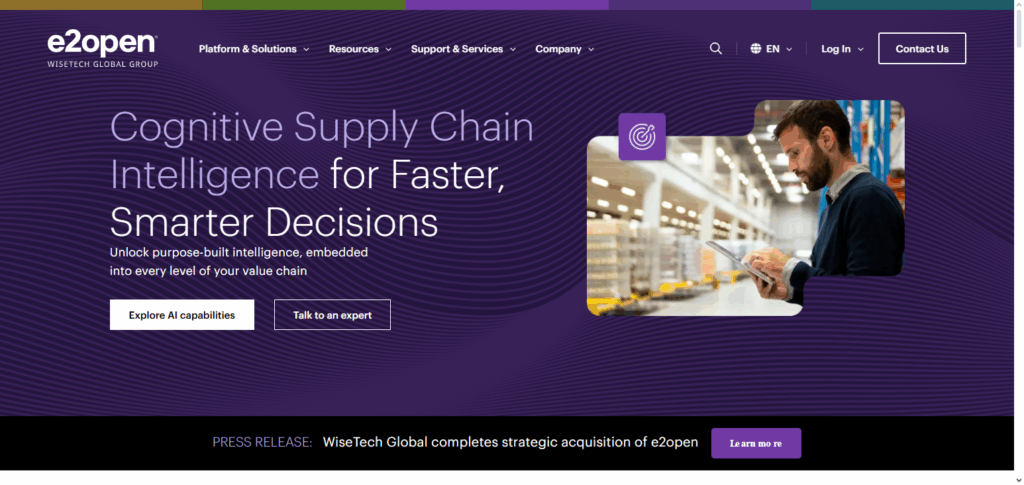
Unlike conventional tools, E2open assimilates trading partners, inventory, and transportation information in real time, which allows for the automation of smarter and quicker decisions.
As a replacement, E2open helps companies increase forecasting accuracy, lower expenses, and improve the responsiveness and agility of the supply chain to enhance competitive advantage in the ever-changing market landscapes.
Pros & Cons AI Tools for Supply Chain Management
Pros
- Improved Forecasts – AI enables more accurate predictions of demand, leading to reductions in both stockouts and overstocking.
- Operational Efficiency – AI automates routine operational functions and therefore, saves both time and money.
- Real Time Visibility – AI improves the tracking of inventories, shipments, and even the performance of suppliers.
- Risk Management – AI provides early warnings for risks of disruption and offers alternative strategies for mitigation.
- Better Strategic Planning – Data-driven insights provided by AI technologies aids in enhancing strategic planning.
- Adapting to Business Changes – AI scales and adapts to the growing complexities of the business and the supply chains.
Cons
- High Costs of Implementation – The setup and integration frameworks are often extremely expensive.
- Data Dependency – The reliance on data means that inaccurate or incomplete data greatly reduces the effectiveness of AI.
- Difficult Integration – Merging with legacy systems poses more complexities than originally anticipated.
- Sufficiently Skilled Personnel – The managing and interpreting insights provided by AI requires trained personnel.
- Security Risks – Data regarding the supply chains that are sensitive and proprietary face cybersecurity risks.
- Reluctance to Change – Adapting to AI workflows poses challenges on the employee side.
Conclusion
To summarize, the effect of AI tools on the planning, execution, and optimization of business operations and their entire supply chain management processes is revolutionary.
Efficiency, prompt response to interruptions, real-time visibility, and data-informed decision making, all contributed accuracy, forecasting precision, and AI-powered technologies. There are still hurdles to be cleared such as the high cost of initial implementation and integration intricacies.
However, the advantages AI-powered solutions present to businesses far outweigh the challenges. The competition in today’s world is fast-paced and global, making businesses more resilient, agile, and customer-centric. Companies that adopt AI technologies improve their supply chain management.
FAQ
How do AI tools improve supply chains?
They analyze real-time data to predict demand, track shipments, detect risks, and automate workflows, improving speed, accuracy, and decision-making.
Are AI supply chain tools expensive?
Implementation costs can be high, but the long-term savings from efficiency, reduced waste, and better planning often outweigh initial expenses.
Can AI tools integrate with existing ERP systems?
Yes, most leading AI supply chain tools are designed to integrate with ERP and legacy systems for smooth adoption.

